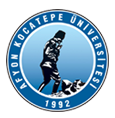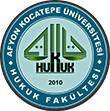Hakkımızda
AIM AND SCOPE
In the 21st Century, Comparative Law is blossoming as globalization ascends the interdependence between legal systems. As Bernhard Grossfeld expressed “A legal order that is not open to dealings beyond its own borders loses its connection to international development, and becomes rigid and sterile”. Hereupon, it must be enunciated that comparative law builds bridges between legal traditions and goes further than only comparing legally binding texts, legislation and cases. It is a dynamic, vital scientific field with transboundary roots investigating cultural, sociological, historical and even anthropological dimensions of legal systems.
If one perceives the world through the glasses of his own legal tradition, he may be falsified on the content and the context of notions belonging to foreign laws. Therefore, the Eurasian Journal of Comparative Law (EAJCL), which will be published by the Private Law Department members of Afyon Kocatepe Faculty of Law, aims to cultivate to the understanding of legal notions in different legal systems, create awareness of comparative law among legal scholars in European and Eurasian Region, neighbouring countries and especially in Turkey. EAJCL’s object involves demonstration of Comparative Law as not only a field of comparison of particular positive law concepts belonging to different foreign laws, but also it’s profound methodological background. At the crossroads of a diversity of legal traditions, EAJCL targets to increase legal interactions between the countries of the European and Eurasian Region and contribute to the development of comparative law theory.
EAJCL is an open-access international, peer-reviewed journal that will be published twice a year. The language of publication is English. The journal accepts articles in the field of comparative law, especially on the legal systems of the European and Eurasian Region, specific legal problems of the European and Eurasian Region countries and the general theory of comparative law. EAJCL publishes original scientific studies through research articles, short reviews, case reviews, book reviews and translations. The conformity of the original papers subject to publication with the academic criteria is evaluated by two independent reviewers in a two-way blind review system.
ETHICAL PRINCIPLES AND PUBLICATION POLICY
Eurasian Journal of Comparative Law is committed to upholding the highest standards of publication ethics and pays regard to Principles of Transparency and Best Practice in Scholarly Publishing published by the Committee on Publication Ethics (COPE), the Directory of Open Access Journals (DOAJ), the Open Access Scholarly Publishers Association (OASPA), and the World Association of Medical Editors (WAME) on https://publicationethics.org/resources/ guidelines-new/principles-transparency-and-best-practice-scholarly-publishing.
Plagiarism, falsification or misrepresentation of data, divisional publication, repetition of publication, inclusion of non-contributory authors, breach of copyrights and prevailing conflict of interest are unacceptable practices within the ethical rules.
The Eurasian Journal of Comparative Law applies the most advance principles regarding mistakes, ethical violations and disclaimers. It is deemed to be declared that the content of the studies submitted to the journal is original.
Necessary legal actions will be taken in case of any ethical violations regarding the above stated or similar principles. All parties involved in the publishing process (Editors, Reviewers, Authors and Publishers) are expected to agree on the following ethical principles.
-
GENERAL ACTIONS AGAINST SCIENTIFIC RESEARCH AND PUBLICATION ETHICS
Authorship: It is considered wrongful to include individuals who have not actively contributed to the work as authors or to exclude individuals who have contributed to the work from authorship. Authors should have contributed sufficiently to all stages of the work, such as planning, data collection and evaluation.
Falsification: Using data that is not based on research, does not exist in reality or has been altered is considered as data falsification.
Plagiarism: It is considered plagiarism to present the methods, original ideas, data, writings or figures of others as one's work in whole or in part without proper citation under scientific rules. In order to avoid plagiarism, authors should cite their works under scientific rules and pay attention to the citation of all scientific articles in their research.
Distortion: Changing the records or data collected without conducting research, showing devices or materials not used in the research as if they were used, falsifying or shaping the research results in line with the interests of the people and organizations receiving support are considered within the scope of distortion.
Dividing and Publishing: Inappropriate sectionalization of the results of research in a way that infringes the integrity of the research, publishing the sections in more than one number without referring to each other, and presenting these publications as separate publications are considered within the scope of the divisional publication.
Duplicate Publication: Presenting duplicate publications as separate publications without referring to previous publications is considered within the scope of publication repetition. The responsibility for the fact that the works submitted for evaluation have been previously published elsewhere or are in the evaluation process lies entirely with the authors. Authors should avoid repetition and take care in submitting original research.
-
RESPONSIBILITIES OF THE RELEVANT PARTIES
Editor's Responsibilities
-
The editor is responsible for publishing the submitted manuscripts. The editor evaluates submissions without taking into account the race, ethnicity, gender, religion, belief, nationality and political views of the authors. The decision is based on the article's significance, originality and clarity, as well as the validity of the work and its relevance to the scope of the journal. Applicable legal requirements regarding defamation, copyright infringement and plagiarism must also be considered.
-
Unpublished material used in a submitted article can only be used by the editor or editorial board members for their personal research purposes with the author's written permission.
-
The editor cannot share relevant information about the submitted manuscript with persons or institutions other than the corresponding author, reviewers, editorial board members and the publishing organization.
Responsibilities of Authors
-
Authors should indicate the originality of their work. Submitted articles must comply with the journal rules.
-
Authors should not have published the articles submitted to the journal elsewhere or submitted them for publication.
-
Authors should indicate the sources of the information in their studies and cite the studies in question.
-
Authors should guarantee that they have made a scientific contribution to the article, and it should be recognized that all authors have equal responsibility for the article.
-
If at any time authors notice a significant inaccuracy or uncertainty, they should immediately report the inaccuracy or uncertainty to the editor.
Responsibilities of Reviewers
-
If the reviewers do not consider themselves competent in the submitted article or if they consider that they cannot evaluate the article within the specified time, they should notify the editor and withdraw from the evaluation process.
-
The article submitted for evaluation should be considered as a confidential document.
-
Evaluations should be made impartially. No individual criticism of the author can be made. Reviewers should clearly state their views together with supporting arguments.
-
Reviewers should inform the editor about the similarity of the article with other publications.
-
Any data or considerations determined during the evaluation process of the submitted manuscript should not be used for personal advantage. Conflicts of interest should be reported to the editor.




